Slumber Journeys
Brooklyn, November 2023
As burnout escalates to alarming levels and over 50% of young people succumb to bedtime revenge procrastination, the wellness industry experiences growth in sleep tourism. Consumers now emphasize wellness and fixate on maximizing productivity. I try to analyize the new attitudes, products and experiences associated with getting a good night's rest and hope to find tendencies, asking: How can brands capture the spend of sleepy consumers on the go?

Quality sleep is now a rare commodity, but a new travel trend in 2025 prioritizes it, recognizing the link between sleep and well-being. Leading travel brands offer amenities and digital tools for ideal sleep experiences. While some UK Gen Z individuals report improved sleep post-pandemic, concerns linger, especially among those anxious about sleep's impact on health. 54% of women stress about adequate sleep, with 38% acknowledging stress affecting sleep quality. The popularity of sleep-related content on platforms like TikTok, seen in 33 million views for #SleepHygiene, highlights a growing interest in sharing sleep tips. This sleep tourism trend is expected to appeal to the Time Keepers cohort and those dealing with overwork and underpayment, particularly working women.

RESTORATIVE REST
Consumers need sleep for sustenance amid a polycrisis and hotels and retreats must rethink offerings that are designed to recharge guests. Quality sleep serves as a longevity trick, connected to enhanced brain function and a lower disease risk. With many consumers grappling with inadequate sleep, hotels are prioritizing sleep experiences as their main attraction. Lifestyle brands can enhance sleep-centric spaces by incorporating small indulgences like sleep accessories into rooms and retreats. Hotels should create stays that facilitate a break from technology, promoting better sleep through low-tech digital detox experiences.
EXAMPLE | AI-ENABLED SMART MATTRESSES
New York’s Park Hyatt opened six Restorative Sleep Suites with AI-enabled smart mattress brand Bryte in 2022, which boast 90 cushions that adapt to bodies and can determine climate and provide sleep statistics.
EXAMPLE | CHECK-IN-TO-CHECK-OUT
The Zedwell in London is “the hotel you check in to check out", with soundproof rooms that block out noise. There are no TVs to discourage digital distractions before bed (as this can lead to depression and anxiety)
Hotels are unleashing rest packages that stretch days and offer escapism or hacks for better sleep habits. Six Senses in Ibiza offers three-, five- or seven-day deals with fitness classes and a consultation with a sleep doctor. Sleep brands are even offering hotel stays that centre rest. Mattress label Emma unveiled two sleep-focused hotels in Sydney and Taipei, while lux Swedish mattress brand Hästens unveiled a sleep spa hotel in Portugal.
SLEEP AS A SERVICE
From hotel rooms to mobile apps, the demand for good sleep is influencing brands to provide sleep as a service for those on the move. Hotels are redefining the wake-up call with the rise of the sleep concierge, with humans and digital tools stepping in to lull guests to sleep. Recommondation: Partner with leading sleep experts to develop programming and one-toone coaching sessions to help burned-out travellers heal.
EXAMPLES | SLEEP SANCTUARIES
New York's Benjamin Hotel enlisted NYU sleep researcher Dr. Rebecca Robbins to transform rooms into sleep sanctuaries with noise-reducing windows, a pillow menu and a Power Nap Kit with sleep products
London's Cadogan has a pillow menu and plush products such as a weighted blanket and scented pillow mist. It also teamed with hypnotherapist, Malminder Gill offering a guided meditation on its app
The Simple Habit is a meditation app boasting just 10% sleep content despite 70% of users leveraging it for sleep. This inspired the launch of Sleep Reset, an app that is a "digitalised, personalised sleep clinic", with sleep coaches offering tailored recommendations and text feedback. It offers an eight-week science-backed course helping to reduce sleep stress sans pills and promises improvements in two weeks. App users need 53% less time to fall asleep and almost 50% stop taking sleeping pills post-app

DIGITALLY DOZING OFF - TECH FOR THE ESCAPE AND RECONNECTION
Lean into VR to offer immersive sleep solutions or transport those who cannot rest and those who are looking for an escape from reality. As more people use VR, new lifestyle norms are emerging. 'Sleep rooms' on social VR platform VRChat attract the lonely and sleep-deprived with a respite from reality. VR offers users a chance to escape into an immersive and embodied space, which makes VR sleep rooms feel real, and emerge as medicinal rituals for lonely and sleep-deprived people. Recommondation: Hotels should offer VR sleep experiences to expand IRL guests' imaginations, but also dismantle reality privilege and lure in remote audiences interested in exploring the property digitally.
EXAMPLES
Inter-Dream was a 2019 research project out of Melbourne's RMIT University, which aimed to help people sleep. With a VR device, viewers could experience a multisensorial immersive display that merged multicolour and multi-shaped transient kaleidoscope-like visuals with ambient music, designed to prevent pre-bed jitters and help create calm. Participants who used the device were 55% less fearful after and experienced 8% more positive emotions and 13% more serenity
The Lake Nona Wave Hotel in Florida offers Well+ech guests access to VR meditation. While wearing a VR headset, guests enjoy pre-recorded or live music and multisensorial meditation and breathwork.
KEY STRATEGIES
1. OFFER REST-ENHANCING PRODUCTS & SERVICES
Hospitality brands can offer moments of recovery via experience, whereas f&b, beauty and fashion brands should work with these hotels to roll out on-premise product placements.
2. DOZE-OFF WITH DIGITAL SLEEP JOURNEYS
Virtual Reality (VR) could emerge with more medicinal wellness purposes. VR sleep solutions and opportunities for digital care integration may become reality sooner than we think.
3. MAY IS THE BETTER SLEEP MONTH
Use this time to promote sleep solutions, while keeping long-term holistic rest solutions in mind.
*all Images are produced by Annabelle using collaging methods and AI: #Midjourney